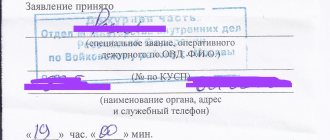Home/Complaint/Complaint against a police officer
Officials of government bodies and structures are representatives of the authorities, which leads to the imposition of specific responsibilities and powers on them. Any violation of legal requirements, as well as human rights and freedoms, gives rise to grounds for a citizen to file a complaint against a police officer. The reasons, procedure, timing, features of sending appeals to the controlling and supervisory authorities of police officers are regulated by the norms of the current legislation.
Attention
Depending on where a complaint against a police officer is addressed, the legal framework will be different, since the work of different government agencies is regulated by different laws. In order to understand the numerous requirements of the legislator and understand what to do in a situation where rights and interests are violated, you can refer to the article below. It contains answers to the most important and common questions that arise in the process of filing a complaint against a police officer.
Is it possible to complain about a police officer?
The activities of law enforcement officers, including the police, are strictly regulated by modern legislation. Regarding the police service in the Russian Federation, the Federal Law “On Police” No. 3-FZ, art. 53 of which establishes that actions (inactions) of officials who violate the rights and legitimate interests of a person, a government body (local government), public or any other organizations can be appealed to a higher police authority or a police officer, as well as to the authorities prosecutor's office or court. Thus, in accordance with Art. 53 of the Federal Law “On Police”, the activities of police officers can be appealed by interested parties.
Attention! If you have any questions, you can chat for free with a lawyer at the bottom of the screen or call Moscow; Saint Petersburg; Free call for all of Russia.
What actions of a local police officer are considered unlawful?
To understand how much authority a local police officer has, let’s look at the legislation. The rights and responsibilities of this category of officials are contained in:
- Federal Law of 02/07/2011 No. 3-FZ “On the Police”, Chapter 3 of which is devoted to the rights and responsibilities of police officers;
- Order of the Ministry of Internal Affairs of Russia dated April 30, 2012 No. 389 “On approval of the Manual on the procedure for performing duties and exercising the rights of the police in the duty station of the territorial body of the Ministry of Internal Affairs of Russia after the delivery of citizens”;
- Order of the Ministry of Internal Affairs of Russia dated March 29, 2019 No. 205 “On the performance of service by the local police commissioner in the administrative area served and the organization of this activity”;
- Code of professional ethics for police officers of the Russian Federation, approved by Order of the Ministry of Internal Affairs of the Russian Federation of December 24, 2008 No. 1138.
These regulations establish a closed list of rights and obligations of district police officers. Accordingly, violations on their part will be exceeding the powers given to them or, conversely, failure to fulfill their duties, inaction.
Among such violations are:
- lack of timely response to calls;
- refusal to accept an application or to consider it;
- unreasonable document check or detention;
- home invasion, search and inspection without reasonable grounds;
- inaction in cases where it is necessary to quickly stop an offense, examine evidence and evidence;
- refusal to introduce himself: to state his full name and position, to present his identification;
- other violations of laws on law enforcement agencies.
In addition, based on the provisions of the Code of Professional Ethics, police officers must behave respectfully towards citizens, avoid rude and cynical expressions, always show restraint and respond to questions and requests from citizens.
Crimes such as solicitation of bribes or forgery of documents may be punishable offenses by law enforcement agencies.
Reasons for complaining against a police officer
Taking into account the essence of Art. 53 of the Federal Law “On Police”, there are two main reasons, for any of which a person can file a complaint against a police official:
- Inaction of a police officer in the case where active activity and intervention are recognized as necessary in order to restore order, violated rights or the state of security in society.
- Illegal actions of a police officer that go beyond the scope of official authority or otherwise violate the law, human rights and freedoms.
In practice, the first group of reasons for a complaint against the actions of a police officer includes the following situations:
- The district commissioner does not take into account citizens’ complaints and appeals and does not conduct regular inspections of the administrative district.
- The investigator does not carry out procedural actions.
- The detective does not participate in operational search activities and special operations.
- The police officer on duty does not accept a statement or report of a crime.
- The police patrol on duty does not go to the scene of the incident and does not control the area entrusted to it.
The second group of reasons for complaints against a police officer can include other cases:
- Illegal use of physical force, firearms or special means by a police officer.
- Illegally initiating an investigation if there were no objective reasons for this.
- Illegally checking documents or conducting investigative actions without factual or legal grounds for this.
IMPORTANT
The presented lists of reasons for filing a complaint against a police officer are not exhaustive, that is, in practice other situations may arise that will also violate the rights and interests of citizens, or legal requirements. This suggests that each case should be considered individually.
For what reasons can I complain?
There can be many reasons, but the most common are the following:
- A police officer (precinct) acts unlawfully, violates the law, acts not in accordance with the regulations, exerts pressure;
- Law enforcement officers did not come when called,
- The employees accepted the statement that a crime had been committed, but were in no hurry to carry out verification activities;
- If a check on the application was carried out, but rather superficially and formally, and based on its results, the initiation of a criminal or administrative case was refused;
- If the police fail to act in other situations;
- If, after the initiation of a criminal case, police officers do not carry out the necessary investigative measures and rush to quickly close it and put it in the archives;
- Employees of internal authorities behave defiantly and not in accordance with the regulations.
In the above situations, it is highly undesirable to delay writing an appeal to the supervisory authorities, therefore measures must be taken without delay.
Where to file a complaint against a police officer?
Article 53 of the Federal Law “On Police” establishes the following authorities to which a complaint against a police officer can be sent:
- Higher authority - depending on what level of police officer committed the violation, several supervisory authorities can be distinguished. An application for a full-time police officer can be sent to the head of the territorial department in which the first serves; to the head of a territorial unit - to a district or city branch; for representatives of the city (district) Department of Internal Affairs - to the main department of the Ministry of Internal Affairs for the region.
- The Prosecutor's Office is a universal supervisory body that operates throughout the Russian Federation and exercises control over many government bodies. In accordance with Art. 52 of the Federal Law “On Police”, the work of the police is supervised by the Prosecutor General and the prosecutors subordinate to him. The activities of prosecutors in this area are regulated by Chapter 3 of the Federal Law “On the Prosecutor’s Office of the Russian Federation.”
- The court is the highest authority authorized to protect the rights and legitimate interests of citizens and legal entities. You can file a claim if you need to appeal the decision of a police officer, or you need compensation for material (moral) damage. In accordance with Art. 51 of the Federal Law “On the Police”, control over the work of the police is exercised by the court according to the rules of the current legislation.
- Public organizations, including the Public Chamber of the Russian Federation - in accordance with Art. 50 of the Federal Law “On the Police”, these associations exercise control over the work of the police in accordance with the law.
- The President of the Russian Federation, the chambers of the Federal Assembly of the Russian Federation, as well as the Government of the Russian Federation , within the powers that are regulated by the Constitution of the Russian Federation, federal legislation and federal constitutional regulations, exercise control over the police (Article 49 of the Federal Law “On the Police”).
Attention
The law does not establish the powers of such a department of the internal affairs department as the department of internal security, which in practice was specially formed for the purpose of conducting verification activities in relation to existing police officers. Thus, you can also appeal the actions or decisions of internal affairs officials to the Internal Affairs Directorate, which is included in the regional departments of the Ministry of Internal Affairs of Russia.
If a citizen decides to appeal the activities of a police officer, it is necessary to act in order of hierarchy, that is, first send the application to the violator’s immediate management, then to a higher superior, then to the prosecutor’s office, other organizations and the court. For example, the prosecutor can return a complaint to the Department of Internal Affairs if the applicant has not previously applied there.
Kachkanarsky urban district official website
How to file a crime report with the police, its types, filing options, registration and consideration procedures
Methods for filing a police report.
According to the Instructions, applications and reports of crimes submitted by:
To the police department personally by the applicant or his representative.
Remotely, if a personal visit is not possible:
through electronic services on the official websites of departments of the Ministry of Internal Affairs; facsimile communication (fax); by phone; by mail.
The most effective way is personal appeal.
Let's look at the filing procedure and requirements for reporting a crime to the police department.
Where to apply?
According to the general rule of territorial jurisdiction (Article 152 of the Code of Criminal Procedure of the Russian Federation), an inspection of a crime is carried out by the unit whose powers extend to the place where it was committed.
Sometimes it can be difficult for an applicant to determine where to apply. In this case, the Instruction establishes that a statement about a crime can be accepted at any police unit on the territory of Russia, regardless of: the place where it was committed; date and time; prescription; the adequacy of the information contained therein; its forms. After carrying out the necessary measures, the authorized police officer determines the department that should conduct an inspection of this application. Collected documents and information are sent to this department.
Form and content of the application.
The law does not impose strict requirements for the content of a written or oral statement to the police about a crime, and there is no established template. According to general rules, it consists of a cap, a main part and a pleading part.
Cap - addressing the application to a specific head of the Ministry of Internal Affairs unit. It also contains information about the applicant, address of residence and his contacts. Contacts are necessary, among other things, to obtain information about the results of the inspection.
The main part is to describe briefly or in detail the circumstances of the incident in your own words. Police officers will be required to interview the applicant, during which they will clarify any ambiguities, fill in gaps, and find out circumstances not reflected in the application.
A request to conduct an investigation and/or bring the perpetrator to criminal liability for the crime. In this case, the statement can either begin with the pleading part or end with it. Warning of liability under Art. 306 of the Criminal Code of the Russian Federation for knowingly false denunciation. This warning is certified by a personal signature.
Submission deadline.
Every crime has a statute of limitations, after which the offender cannot be subjected to the punishment he deserves. He is exempt from criminal liability, even if guilty. Therefore, you must submit an application within this period, or better yet, immediately, because the sooner it gets to the police, the greater the likelihood of its disclosure. The statute of limitations for criminal prosecution (Article 78 of the Criminal Code of the Russian Federation) depends on the severity of the act committed (Article 15 of the Criminal Code of the Russian Federation).
Remote police report
Report to the police by phone.
Reports of crimes received by telephone (02, 112) are also registered, documented in a report from an authorized police officer, and an investigation begins.
Submit online.
The official websites of police departments at various levels have services for filing reports of crimes. To receive them online via the Internet, you must enter data in the required fields. Subsequently, they are printed on paper, registered in the prescribed manner and sent for work.
Filing a police report by mail.
Each police department has a mailbox at the entrance for citizens' requests. The statement of a crime can be omitted there too. Correspondence is removed from the mailbox at least once a day.
Is it possible to write an anonymous statement?
Anonymous statements are considered to be statements about crimes that do not contain information about the applicant - his name, address, etc. Such statements are also those that contain non-existent information about the applicant, or the information of a person who did not contact the police. If the data set out in them is confirmed and the facts described contain signs of a crime, the established circumstances are set out by the authorized police officer in a report, it is registered and based on it, and not on an anonymous statement, a pre-investigation check is carried out. Naturally, the applicant will not be notified of the results of the consideration of the anonymous complaint to the police, nor of the results of the pre-investigation check on the facts stated in it.
Is it possible to supplement or rewrite a statement to the police?
Reporting a crime to the police is just a reason to initiate a case if there are grounds for it. In other words, this is only the document with which the criminal process begins. Therefore, there is no need to supplement the statement itself or rewrite it during the pre-investigation check. The materials of the pre-investigation check are not evidence in a criminal case; for this reason, there are no requirements for their form, content and other similar characteristics. That is, additions, clarifications and amendments can be formatted in any way and attached to the audit materials.
What happens after you submit your application?
After a statement or message to the police about a crime in another form is registered in the KUSP, the operational duty officer, if necessary, takes emergency response measures provided for by law and department orders. If such measures are not necessary, the registered application is transferred to the head of the police department or an authorized officer, with a written resolution defining the time frame and procedure for conducting an inspection for each specific application and the official who will be entrusted with conducting the inspection.
The executors are most often appointed employees of departments in the areas of activity who, at the stage of the pre-investigation check, exercise the powers of the investigator specified in Art. 144 Code of Criminal Procedure, they can be:
district commissioners (for example, for domestic and minor crimes: beatings, minor thefts, fraud, death threats, etc.); criminal investigation officers - for more serious (robberies, robberies, extortion, etc.) or group crimes; detective units of economic security and anti-corruption - for crimes in the field of economic activity (counterfeiting, fraud, bribery, etc.).
After this, the application against signature in KUSP is transferred to the executor, who begins to carry out verification activities in accordance with Art. 144–145 Code of Criminal Procedure of the Russian Federation.
Review period.
The total period for checking a crime report is 3 days. If it is impossible to verify all the necessary data within this period, it can be extended up to 10 days. If it is necessary to conduct research, operational investigative activities, etc., the period can be extended up to 30 days.
Police officials are not required to make decisions within this period. That is, if all the circumstances were established in a shorter period of time, for example, 1, 7 or 20 days, the decision can be made earlier. But often these terms are not enough for a comprehensive study of what happened. In this case, the police officer may make a so-called interim decision to refuse to initiate criminal proceedings, which is subsequently cancelled. From the moment the inspection material is received by the contractor after the cancellation of such a decision, the above deadlines begin to run again. The law does not limit the number of such facts, except for the requirement to comply with a reasonable period of criminal proceedings.
Decisions on the application.
Based on the results of the pre-investigation check on a statement to the police about a crime, depending on the results, one of the following decisions may be made:
On the initiation of a criminal case. It is transferred to the divisions of the police department authorized to conduct a preliminary investigation (inquiry, investigation). On refusal to initiate criminal proceedings. In this case, the inspection material is registered in a special accounting journal, it is assigned a serial number, under which it will subsequently be stored in the archive. The material number will consist of two numbers – KUSP number/material number. On the transfer of the message and collected materials under investigative jurisdiction, if the police department to which they were received is not authorized to make a decision. On attaching a new statement to the verification material on the same fact.
How to find out the result?
Any decision made on a criminal complaint must be communicated to the complainant. At the same time, it must be explained to whom and in what order this decision can be appealed. The applicant must be notified of the initiation of the case. If he is also a victim, he has the right to receive a copy of the relevant decision. The applicant is notified of the refusal to initiate within 24 hours from the decision being made; in addition to the notification, he is required to send a copy of the decision made. If, based on the application, a decision is made to transfer it under jurisdiction or to attach it to a previously registered message, the applicant is also notified about this with an explanation of what, where, for what and why it was sent or attached.
If there is no response to the application.
In cases where, in the opinion of the applicant, the inspection period is being delayed, no actions, calls, etc. are being made by police officers, notifications and messages about the results of the inspection have not been received, the fate of the application can be found out: From the official entrusted with carrying out the inspection. In the police control room. In its accounting and registration department. The telephone number by which information can be obtained is indicated in the notification coupon. If it is not there, the contact telephone number can be found on the official websites of police departments. To find out the result of consideration of the application, you will need to provide the data specified in the notification coupon - full name of the applicant, date of application, KUSP number.
Hotline number for complaining about a police officer
Currently, there are several ways to file a complaint against police officials in the Russian Federation:
- Personally as part of a reception with a boss or other official.
- By post to the address of the Department of Internal Affairs or another government agency or employee.
- Compose an appeal and submit it through a mailbox located in the police building or other government agency.
- Through the Internet portal of the Russian Ministry of Internal Affairs in the form of an electronic appeal.
- Verbally via hotline.
Attention
There is currently a free telephone line for complaining about a police officer: 8-800-222-74-47. Using this phone, any person can report a crime or other offense, as well as a complaint against a police officer, 24 hours a day.
In order to understand the mechanism for filing a complaint against a police officer via the Internet, you can use the following link: MIA.RF. The complainant should select a department to send a complaint, read the rules and form an appeal.
Administrative complaint against a police officer
In total, the appeal process can be divided into two types: administrative and judicial. The first option of a complaint against the actions of a police officer is relevant if the appeal is addressed to any department of government authorities that is not included in the judicial system. The second option concerns filing an application through the court. The procedure, features, deadlines for filing and consideration of an administrative complaint are regulated by the provisions of the Federal Law “On the procedure for considering appeals from citizens of the Russian Federation,” as well as those laws and departmental orders that determine the activities of certain government bodies. For example, the Federal Law “On the Prosecutor’s Office of the Russian Federation”, order of the Ministry of Internal Affairs of September 12, 2013 No. 707 “On approval of the Instructions on organizing the consideration of citizens’ appeals in the system of the Ministry of Internal Affairs of the Russian Federation”, Federal Law “On the Government of the Russian Federation” and others.
The possibility of filing an administrative complaint against the actions of police officers is also provided for by the requirements of the Code of Administrative Offenses (hereinafter referred to as the Code of Administrative Offenses of the Russian Federation). For example, in the case of appealing a decision in a case of an offense (Article 30.2 of the Code of Administrative Offenses of the Russian Federation).
Features of compilation
Regardless of which authority you decide to write a complaint to, take into account the following:
- The author of the complaint can be any person whose rights have been violated. It can be either the victim in the case or the legal representative of the victim, the accused, his relatives, etc. In addition, the application can be signed by a representative by proxy in the interests of a certain person with whose personality the events are connected, as well as by a lawyer.
- The complaint can be written either by hand or compiled on a computer.
- The law does not contain any requirements for text formatting. At the same time, the application must meet certain criteria of local legislative acts. So, if you are preparing a statement about police inaction to the prosecutor’s office, it will be useful to know about some of the rules enshrined in the Instructions on the consideration of appeals, approved by the Prosecutor General of the Russian Federation. According to this internal document, prosecutors have the right to leave without consideration applications that do not contain a return address, as well as from the content of which it is impossible to understand the meaning of what happened, etc.
Deadlines for filing a complaint against a police officer
As a general rule, there is no time limit within which an interested person can file a complaint against a police officer. At the same time, the applicant must comply with the principle of reasonableness, that is, submit an appeal at a time when it is really relevant and violates certain rights and interests. Thus, despite the fact that there is no strict framework in this matter, we recommend filing a complaint as quickly as possible, while its requirements have not yet lost their significance.
IMPORTANT
There are exceptions to the general rule. For example, if a police officer’s decision in a case of an administrative offense is appealed, Art. 30.3 of the Code of Administrative Offenses of the Russian Federation, the legislator determines 10 days from the date of delivery of a copy of the document. In this case, the period is strictly limited. In this regard, we recommend that you consider each situation individually, focusing on the Code of Administrative Offenses of the Russian Federation and other federal laws.
Procedure for considering a complaint against a police officer
Taking into account Art. 11 of the Federal Law “On the procedure for considering appeals from citizens of the Russian Federation” and clause 3 of the Instruction on organizing the consideration of citizens’ appeals in the Ministry of Internal Affairs system, approved by Order of the Ministry of Internal Affairs of Russia No. 707, the procedure for receiving and checking complaints against the actions of a police officer can be presented in the form of the following algorithm:
- Reception of received requests by employees of office management departments.
- The initial processing of the application is a superficial analysis of the concept of the essence of the appeal and the subject of the appeal.
- Registration of materials in electronic form and in log books - within 3 days from the moment they are received by the government authority (clause 2 of article 8 of the Federal Law “On the procedure for considering appeals from citizens of the Russian Federation”).
- The adoption by the head of the body of organizational decisions regarding the procedure for considering applications, that is, the establishment of an official authorized to analyze the application.
- Transfer of documents to the head of the department whose competence includes consideration of a specific complaint.
- Sending a message to the direct executor.
- Consideration of materials on their merits followed by decision-making.
- Sending a response to the applicant.
- Collection and storage of materials collected in response to a complaint against a police officer.
If necessary, this algorithm can be supplemented with other steps, namely, personal reception of citizens, as well as analysis and monitoring of the consideration of a complaint against the actions of a police officer. The specified algorithm is relevant for the system of the Ministry of Internal Affairs, however, it can be considered general, since in the prosecutor's office and other government agencies the process for considering complaints is the same.
In accordance with paragraph 1 of Art. 11 Federal Law “On the procedure for considering appeals from citizens of the Russian Federation”, paragraphs 129-132, 146 of the Instructions on organizing the consideration of citizens’ appeals in the Ministry of Internal Affairs system, approved by order of the Ministry of Internal Affairs of Russia No. 707, complaints without information about the full name, address and telephone number of the applicant are registered in the prescribed manner , and are also considered (if there are signs of a crime), but no answer is given.
Complaint against a police officer to the Ministry of Internal Affairs
In order to file a complaint against a police officer with the Ministry of Internal Affairs, a citizen or representative of a legal entity must follow the following sequence of actions:
- Determining the fact of violation of the law or one’s right.
- Preparing a complaint in writing.
- Collection of applications necessary to confirm certain facts reflected in the appeal.
- Selecting a complaint method based on available resources.
- Submission of collected materials to a government agency or police department.
- Receive a message about registration of the request. Using this number, you can further track the fate of the complaint and the decision on it.
The specified algorithm for filing a complaint against a police officer with the Ministry of Internal Affairs is not strictly regulated by the norms of Russian legislation, but follows from the interpretation of the system of regulatory requirements reflected in the Federal Law “On the procedure for considering appeals from citizens of the Russian Federation.”
In the process of filing a complaint against a police officer, important importance is given to the preparation of the complaint itself. To do this, it is recommended to refer to the following sample complaint against a police officer at the Ministry of Internal Affairs, which you can.
There is no time limit for filing a complaint with the Ministry of Internal Affairs, that is, the applicant can send a corresponding message at any time since the legislator does not define a strict framework. Regarding the duration of consideration of the application, Art. 12 of the Federal Law “On the procedure for considering appeals from citizens of the Russian Federation” specifies a clear rule: materials must be analyzed, and a decision on them must be made within 30 days from the date of registration with a government agency. In the event that the executor of the complaint has sent requests to obtain information necessary to resolve the stated issue, this period may be extended, but not more than by 30 days (clause 2 of article 10 and clause 2 of article 12 of the Federal Law “ On the procedure for considering appeals from citizens of the Russian Federation").
For your information
A complaint that is sent to the head of a regional executive body (the main department of the Ministry of Internal Affairs of Russia at the level of a constituent entity of the Russian Federation) in the area of violation of migration requirements is considered within 20 days from the date of registration.
How long will it take to consider the application?
A complaint about the inaction of a district police officer cannot be considered for more than 30 days. If this deadline is violated, you will have to write a complaint again and indicate that it is being submitted again.
The period for consideration of a complaint may be extended for objective reasons, for example, some information requires additional verification, or it is necessary to request any materials. However, the applicant must be notified in writing of the extension of the consideration period.
If a complaint is simultaneously submitted to several authorities, then if a positive response is received from one of them, the remaining complaints can be withdrawn.
Complaint against a police officer for abuse of power
Exceeding the powers established for an employee by official regulations and legislation constitutes a crime under Art. 286 of the Criminal Code of the Russian Federation. In the event that the applicant has discovered actions by officials that clearly go beyond the limits of what is permissible and lead to a violation of human rights, it is necessary to send not a complaint, but a report of a crime. Taking into account paragraphs. a) clause 1) part 2 art. 151 of the Code of Criminal Procedure of the Russian Federation, this crime is investigated by units of the Investigative Committee of the Russian Federation, which means that the message is sent either directly to the Investigative Committee or to the prosecutor’s office. In the event that there is no corpus delicti (the violation on the part of the police officer did not result in significant harm), it is necessary to contact the employee’s superior management. In practice, most often a complaint is filed against the work of traffic police officers.
Despite the fact that there are no strict requirements for the form of reporting a crime and complaint, it is recommended to use the following sample in order to draw up a competent appeal for abuse of power; you can download it here.
Where to complain?
First of all, a complaint against a district police officer for inaction should be sent to higher management in the same department to which this person belongs. This may be the deputy head of the internal affairs department or the head of the city department of internal affairs. Practicing lawyers even recommend telling the local police officer about this; as a rule, the police officer’s line of behavior immediately changes. If there are no positive changes, then you should immediately write and send or take the complaint to senior management.
Although, to be honest, it is very rarely possible to solve the problem at the local level. The next step in this case is to file a complaint about the inaction of the local police commissioner to the security department of the Central Internal Affairs Directorate. It is this case that is really interested in facts of violation of official duties, and cases of corruption are considered. The Federal Security Service and the Prosecutor's Office may be interested in the fact of inaction.
Complaint against a police officer for boorish behavior
In accordance with Art. 5 of the Federal Law “On Police”, police officers in the process of carrying out their official activities must be guided by observance and respect for human rights. In addition, degrading treatment is prohibited, which means that the official undertakes to suppress any actions that cause moral suffering to the participant in the case. In addition, paragraphs. 3) clause 1 art. 13 of the Federal Law “On Service in the Department of Internal Affairs of the Russian Federation” indicates the duty of a police officer to show respect, tact and courtesy towards participants in the proceedings and other persons. The presented regulations impose a direct ban on boorish behavior and insults by a police officer towards citizens. If a law enforcement officer violates this prohibition, an individual has the right to speak about the violation of his rights and file a corresponding complaint against the police officer with management or the prosecutor's office.
When preparing a complaint for boorish behavior on the part of a police officer, it is recommended to refer to the following sample, which can be used.
Will anonymous requests be considered?
It is quite difficult to count on help and remain an anonymous applicant. Therefore, it is possible that such a complaint will be considered, but the applicant will definitely not know about the decision made. Senior management will definitely react, especially if it is a matter of corruption or a clear violation of official duties, but no one will be able to influence a specific situation.
Complaint about unlawful actions of police officers
In accordance with Art. 53 of the Federal Law “On Police”, those actions of officials that, to one degree or another, violate the rights, legitimate interests of a citizen, or a state or municipal body, public (other) organization, may be the subject of appeal by citizens to a higher body or official , prosecutor's office, court. The presented norm establishes not only the obligation of a police officer to carry out his work within the framework of the law, but also the right of an individual to file a complaint in the event of a violation of the presented competence.
Legislative framework
All representatives of law enforcement agencies must be guided not only by the Constitution of the country, but also by Law 3-FZ, which quite clearly states their duties and rights. Police officers, including local police officers, are required to:
- comply with all requirements of current legislation;
- follow your job description;
- respect the rights and interests of all citizens and legal entities;
- provide first aid if necessary;
- take all possible measures to prevent an offense or crime;
- not to disclose confidential information that was obtained in the course of official duties, and so on.
In addition to this law, the activities of district police officers are regulated by Order of the Ministry of Internal Affairs of the Russian Federation No. 1166. This regulatory act spells out the duties of a district police officer. So, he must:
- ensure the safety of citizens in the serviced territory;
- receive information from citizens regarding offenses and planned crimes, take measures to prevent them;
- know where the so-called hot spots are;
- carry out court decisions (within their competence);
- check reports of planned and committed offenses, and so on.
Each district police officer is assigned a specific microdistrict, where he is obliged to carry out his main function - to protect the rights and interests of the residents of this locality.
Complaint against a police officer to the Internal Security Service
In the event that complaints to the management of the employee who committed the violation did not produce the desired effect, you can contact the State Security Service or the Internal Security Service. This is a specialized unit formed within the system of the Ministry of Internal Affairs and created with the purpose of conducting internal inspections of violations by police officers, as well as bringing the perpetrators to justice. To contact this service, you must have good reasons, supported by real evidence and documents. The deadlines for filing a complaint against the actions of a police officer to the Internal Security Service or the State Security Service are not regulated by law, so the applicant can file an appeal at any time after the incident. In order to submit an application, you need to do the following:
- Determine the basis for filing a complaint and references to legislation regarding this fact.
- Write a complaint and collect attachments to it as necessary.
- Find the nearest department of the Ministry of Internal Affairs, operating at the regional level (since the internal security service operates only within the framework of regional departments). The addresses of territorial representative offices can be viewed at the link: Ministry of Internal Affairs.rf.
- Choose a method to file a complaint.
- Send the collected materials to the nearest CSS or GUSB.
- Receive the request number, which is given when registering it. After 30 days, it will be possible to receive a response to the application (Article 12 of the Federal Law “On the procedure for considering appeals from citizens of the Russian Federation”).
A complaint to the CSS must be formulated competently, concisely, but at the same time setting out all the facts relevant to the case.
What responsibilities does a district police officer have?
Before complaining about an authorized police officer, you need to find out what duties he has. So, the list of direct responsibilities of the district police officer includes:
- maintaining public order in the territory under his control;
- identification of offenses and crimes in the area entrusted to him;
- keeping records of persons (previously convicted of various crimes) who live in the territory under the control of the district police officer;
- receiving applications from residents of houses, conducting verification of crimes committed;
- conducting preventive conversations with teenage hooligans and people leading an immoral lifestyle;
- resolving issues related to the noise of neighbors, the sale of alcohol and drugs on the territory entrusted to him, drinking alcohol near entrances or on playgrounds;
- resolving issues related to illegal cutting of green spaces in the controlled territory, etc.
In what cases can you complain about a local police officer?
There can be many reasons for contacting a higher authority with a district police officer, for example:
- the district police officer does not react in any way to the statement of a person living in the territory under his control;
- The district police officer performs his duties improperly, for example, he covers for neighbors who produce alcohol at home;
- rudeness, threats, humiliation or use of physical force by the district police officer;
- The district police officer broke the law, for example, he entered his apartment without the consent of the owner, breaking the lock.
Complaint about police inaction
In accordance with Art. 53 of the Federal Law “On Police”, the subject of appeal can be not only the actions, but also the inaction of a law enforcement officer. At the same time, a complaint is filed only against those inactions of a police officer that lead to a violation of the rights, interests and freedoms of a citizen, state authorities, local government, public and other associations. Thus, if, through his passivity, a police officer violates the requirements of the law or human rights, the latter can submit a corresponding appeal to higher management or to the prosecutor’s office. Inaction can be expressed in failure to accept a statement about a crime, reluctance to carry out investigative or operational search activities, take explanations from citizens, initiate criminal cases, transfer materials to the prosecutor’s office, etc.
In the event that the subject of the appeal is the passivity of an official, you can use the presented sample complaint against a police officer for inaction, which can be used.
Descriptive part
The complaint can begin with a request to conduct an inspection regarding a specific district police officer. Next, it is necessary to explain the essence of the events that give the right to believe that the official violated the applicant’s rights. Then it is necessary to describe why, in the applicant’s opinion, the district police officer was inactive. For example, he did not interview the seller or pawnshop employee, or examine the documents provided by the applicant. Perhaps the district police officer gave an incorrect assessment of the offender’s actions or made the wrong conclusion about the absence of corpus delicti.
Complaint against a police officer to the prosecutor's office
The Prosecutor General, as well as the prosecutors subordinate to him, in accordance with the powers provided for by Russian legislation, exercise supervision over the implementation of regulations by police officers (Article 52 of the Federal Law “On the Police”). In order to submit an appeal to the supervisory authority, you must do the following:
- Form a complaint against the actions of a police officer in writing, articulating not only the essence of the violation, but also the requirements.
- Collect the attachments necessary to file a complaint and supporting the facts stated in the application.
- Send materials in any convenient way: through the Internet portal, in person to the prosecutor’s office, or by mail.
- After 15 days (or after 30 in exceptional cases), you should receive a decision on the complaint. The presented duration is regulated by clause 5.1 of the Instruction on the procedure for considering applications and receiving citizens in the prosecutor's office of the Russian Federation.
A sample complaint against a police officer addressed to the prosecutor's office can be downloaded from the link here.
Procedure for filing and consideration of a complaint
Main ways to file a complaint:
- online via the Internet (via the official website),
- personally through the reception,
- by mail with registered notification.
The complaint must be submitted in writing and must contain:
- an indication of who the complaint is being submitted to (name of government body),
- applicant details (full name, address, telephone number),
- date, time and place of the events, information known to the applicant about the police officers who violated the rights and interests (full name, position, rank, etc.),
- the essence of the conflict, a description of the situation that served as the basis for filing a complaint, your request,
- date and signature.
Application to file a complaint against a police officer
The courts exercise control and supervision over the work of law enforcement officers (Article 51 of the Federal Law “On the Police”). At the same time, the judicial procedure for appealing the activities of a police officer is reflected in the Code of Administrative Proceedings (hereinafter referred to as the CAS RF). In accordance with Art. 4 CAS RF, every interested person can go to court to protect their rights. In the context of legal proceedings, the police, to whom a claim in a dispute is sent, is an administrative defendant (Article 38 of the Code of Arbitration Procedures of the Russian Federation). In accordance with Article 124 of the Code of Arbitration Code of the Russian Federation, an administrative claim may contain demands to recognize a decision, action or inaction of a police officer as illegal in whole or in a separate part. The sequence of actions in the event of filing a complaint in court against a police officer is as follows:
- Preparation of a statement of claim, as well as attachments to it.
- Choice of court. In accordance with paragraph 1 of Article 22 of the Caspian Code of the Russian Federation, you need to choose the district (city) court that is located at the location of the department of the Ministry of Internal Affairs and the police officer who violated human rights.
- Filing a claim in court in any convenient way. In order not to delay the process, we recommend sending documents in person through the office.
- Upon transfer of materials, the office staff puts a stamp and serial number of the application.
- Appearance in court proceedings, the date and time of which are established in the notice of the court sent to the participants in the proceedings.
- Taking part in the proceedings by verbally confirming the stated requirements, additionally sending petitions, and providing evidence.
- Obtaining a binding court decision.
References to the CAS of the Russian Federation are used as a general rule and relate to most cases of violation of laws by police officers. At the same time, if we are talking about criminal proceedings and the work of investigators (inquirers), it is necessary to refer to Art. 125 Code of Criminal Procedure of the Russian Federation. Regardless of the type of production, the procedure remains the same.
The deadline for filing a complaint against an inquiry officer or investigator in a criminal case is not limited by the legislator, that is, the applicant can do this at any time. At the same time, the duration of consideration of the application by the judge is 5 days (clause 3 of Article 125 of the Code of Criminal Procedure of the Russian Federation).
Attention
In all other cases, the appeal period is 3 months from the moment the person became aware of the violation (Clause 1 of Article 219 of the CAS RF). At the same time, the period for consideration of a complaint in court is 2 months (clause 1 of Article 141 of the CAS RF).
The application to the court must be completed competently and correctly, otherwise the judge may refuse to consider the materials. For correct preparation, we recommend that you seek help from an online consultant.
How to submit an application?
A complaint against a district police officer for inaction must be drawn up in two copies, regardless of the authority to which the application is submitted. On the second copy, the recipient (the employee responsible for sending mail) must mark receipt.
If it is not possible to personally submit a complaint, an authorized person can do this, but he must have a power of attorney with him.
In cases where law enforcement agencies refuse to accept a complaint, you will have to use postal services. It is recommended that the letter be filled out with a list of attachments and issued with notification of receipt.
Complaint about illegal actions of police officers during arrest
The sequence of implementation and the essence of such a preventive measure as detention are strictly regulated by Art. 14 Federal Law “On Police”. This norm defines the concept, list of grounds, term and features of short-term deprivation of liberty. Due to the fact that, within the framework of detention, an important constitutional right of all citizens is limited - the ability to move freely, the legislator does not allow violations of the rules reflected in Art. 14 Federal Law “On Police”. If a particular requirement is violated by a police officer or not fully fulfilled, the citizen in respect of whom the action was taken, or another interested person, can file a complaint against the police officer. To do this you need to do the following:
- State in writing the essence of the violation and the requirements that are put forward to the violator.
- If possible, find and attach evidence supporting the theses of the complaint.
- Select the authority to which the appeal will be sent. This could be the head of the Department of Internal Affairs, employees of regional departments of the Ministry of Internal Affairs, including the Internal Security Service, the prosecutor's office or the court.
- The complaint should be sent to the supervisory authority in any convenient way. Despite the fact that the deadline for appealing is not limited by the legislator, it is recommended to draw up an application as quickly as possible.
- If necessary, appear before the official reviewing the appeal materials, explain certain facts, evidence, and give additional explanations.
- Receive the final decision and determine whether the applicant is satisfied with it or not. In the second case, you can move further up the hierarchy by filing a complaint with a higher authority.
To correctly file a complaint against a police officer who committed an unlawful detention, we recommend that you seek help from a free online consultant.
When to complain
There can be many situations when the rights of citizens to legal protection are violated. Most often such violations manifest themselves in the following:
- You filed an application to initiate a criminal case, but no one is investigating your application.
- The check was carried out, but superficially, without taking into account important circumstances, after which an unfounded decision was made to refuse to initiate a criminal case.
- The case was opened, but under the wrong article of the Criminal Code of the Russian Federation, without clarifying the real circumstances indicating a more serious crime.
- A case has been opened, but practically no investigation is carried out into it: witnesses are not questioned, material evidence is not confiscated, measures are not taken to detain the criminal, etc. Ultimately, the proceedings may be suspended and it will be almost impossible to achieve justice.
- You do not receive any notifications, copies of decisions made, etc., you are in complete ignorance and all attempts to find out what happened to your application are absolutely unsuccessful.
In the listed examples, not only can you turn to the supervisory authorities for help, but you also need to do this as soon as possible . Otherwise, you may miss valuable investigation time “in hot pursuit.”
However, in some situations you can do without writing a complaint. For example, when during a certain investigative action there are inaccuracies or omissions that can be eliminated “on the spot.” There is a legal procedure for correction for this, and it is quite possible not to resort to the appeal procedure.
Example No. 1 . In the theft case, witness P.A. Vasyukov was questioned, whose testimony was recorded in the protocol by the police investigator. Before signing the protocol, Vasyukov P.A. I carefully read the text compiled by the investigator and found a lot of inaccuracies in it. Vasyukov P.A. refused to sign such a protocol because he considered it unreliable. Vasyukov P.A. drew the investigator's attention to the fact that the time and place were distorted, as well as other circumstances that were significant for the case. Acting in accordance with the law, the investigator invited the witness to supplement the contents of the protocol with his own hand, recording clarification on the date, time and place of events, which was done, and subsequently certified by the signature of P.A. Vasyukov.
Thus, if during the interrogation your testimony was recorded inaccurately, in this case there is no need to write a complaint - it is enough, when signing the document, to indicate what you do not agree with and clarify how it really happened.
The same rules apply to the appointment of examinations.
Example No. 2 . The victim Egorov K.A. burned the car, an appraisal examination was ordered using the available documents in order to find out the value of the car at the time of the crime. When making a decision to order an examination, the victim was absent from the city and was unable to raise his questions for the expert’s permission, while the investigator limited himself to only one thing: “what is the value of the vehicle as of November 1, 2016 (date of the crime).” When reading the expert's report, the victim saw that the estimate was significantly underestimated, since the specialists were not provided with documents on the installation of expensive video equipment in the car. The victim contacted the investigator with an application to order an additional examination, attaching the relevant documentation about additional equipment. This request was granted, and as a result of an additional assessment, the value of the car became higher. Thus, in such situations it is also possible to do without an appeal, following the algorithm of the application procedure in accordance with the Code of Criminal Procedure of the Russian Federation.
And yet, in most situations, complaints cannot be avoided. In order to properly appeal the inaction of the police, let's figure out where to go.
Complain against a police officer online
Submitting an appeal through an Internet portal is one of the most relevant, fastest and effective ways to exercise violated rights. In case of an online complaint against a police officer, the sequence of actions will look like this:
- An appeal to a police officer can be sent through the official website of the Russian Ministry of Internal Affairs system. To do this, follow the link: MIA.RF
- A list of departments and divisions of the Russian Ministry of Internal Affairs will appear in the window that appears. In order to determine the authority for filing a complaint, it is necessary to establish which unit the official against whom the complaint is being written belongs. For example, the investigator was inactive - you need to contact the State Investigative Committee, the expert - to the ECC, and so on. By clicking on any of the departments, the applicant can see a list of tasks that they resolve in their activities. Having selected the required authority, click on the “Continue” button located at the end of the page.
- In a few seconds, a page with background information will load, revealing the regulatory framework, the procedure and features of receiving and considering appeals from citizens and other interested parties. After reading the presented data, you should check the box at the bottom of the page in the line “I have read the information”, and then click on the button next to “Submit an appeal”.
- The message receiving service page will load, on which there are several lines to be filled out: position; Full name of the person against whom the complaint is being made; Full name of the applicant or details of the organization on behalf of which the application is being addressed; email for response; telephone number for contact; the scene of the incident; information about the department to which the complaint was previously sent; the nature of the violation and the requirement; files (applications) – as needed. After the specified fields are filled in, you must click the “Send request” button.
This completes the procedure for filing a complaint against the actions of a police officer, and the citizen will receive a corresponding notification by email and telephone. The application will be registered within 3 days, after which officials have 30 days to respond to the applicant.
IMPORTANT
If difficulty arises at the stage of choosing a unit of the Ministry of Internal Affairs of Russia, you can submit an appeal to the Ministry of Internal Affairs (first position) as a general authority, where the application will then be forwarded according to jurisdiction.
Response to a complaint against a police officer
In accordance with paragraph 139 of the Instruction on the organization of consideration of citizens' appeals in the system of the Ministry of Internal Affairs, approved by Order of the Ministry of Internal Affairs of Russia No. 707, a response on the merits of the filed complaint is sent to the citizen. Depending on the method of submission, there are two types of responses: a written response is given to all personal and mailed complaints, and a response in the form of an electronic document to an electronic complaint.
If the complaint was filed by a citizen as part of a personal meeting, the response is sent signed by the official who conducted the meeting (or an employee authorized by him). This requirement is reflected in Art. 140 Instructions on the organization of consideration of citizens’ appeals in the system of the Ministry of Internal Affairs, approved by Order of the Ministry of Internal Affairs of Russia No. 707.
Regardless of the method of filing a complaint against a police officer, the response is always prepared in 2 copies, with the first version being sent to the citizen after registration, and the second remaining in the territorial police department for archival storage (clause 153 of the Instructions on organizing the consideration of citizens’ appeals in the Ministry of Internal Affairs system). The electronic document is redirected to the citizen via e-mail by scanning the written response (clause 156 of the Instructions on organizing the consideration of citizens’ appeals in the Ministry of Internal Affairs system).
Complaint structure
The regulations do not provide for a unified sample of complaints about the inaction of the local police commissioner. Therefore, such papers are drawn up according to the general rules adopted for official documents. An approximate complaint form can be seen in the photos below.
The document must necessarily contain the following information:
- address and name of the authority to which the application is submitted;
- information about the complainant, personal and contact details;
- complete information about the official who is inactive;
- the essence of the complaint;
- request, that is, information about what the applicant wants to receive in the end;
- applications, that is, documents that confirm the inaction of the district police officer.
If the office or duty station refuses to accept the application, then it can be sent through the postal operator.
You can file a complaint against a local police officer either by hand or using a computer; there are no restrictions regarding this. A complaint can even be filed by a lawyer or other authorized person, but only if there is a power of attorney with clearly defined powers.
There should be no corrections or strikethroughs in the text of the complaint. The writing style is businesslike, there should be no swear words, insults or unnecessary reasoning. Just the facts.
As for the sample complaint about the inaction of a local police officer, it may look like the photo below.
Nuances
Filling out and filing a complaint against a police officer is accompanied by strict requirements and a number of nuances that should be taken into account in practice:
- In the process of checking the materials presented in the complaint, management may assign and conduct an internal audit against the violator. In this case, if the latter’s guilt is proven, he will be subject to disciplinary action.
- A complaint can also be submitted to the Public Chamber, which is responsible for monitoring and conducting inspections of all government bodies. In order to submit an application online, you can use the link: eis.oprf.ru
- The Russian Federation has a Human Rights Council, which rarely considers private complaints from citizens. However, if the violation was significant, it may be examined by the HRC.
- Any violation of laws and human rights may be the subject of consideration of an appeal by the President of the Russian Federation. To do this, you can fill out the form at the link: letters.kremlin.ru It should be understood that the complaint to the head of state will also be forwarded to the territorial police department whose employee committed the violation.
- If the complaint contains incomplete or incorrect information about the violation, or contains a threat to the property (life and health) of a person, it will not be considered.
Going to court
If a complaint to the prosecutor's office about the inaction of the local police officer does not give the desired results, then only the court can act as the final authority. To apply, it is necessary to prepare an administrative claim, which any individual whose rights and interests have been violated has the right to draw up. You can also contact the Commissioner for Human Rights or a public association, where they will help you file a claim.
Regulatory acts for filing an administrative claim establish a short limitation period of 3 months. This period is calculated from the moment the person learns that his rights have been violated. Even if the deadline is missed, it is recommended to apply anyway, but first ask the court to reinstate the missed deadline. The court can either fully satisfy the claim or partially, but it can also refuse if the plaintiff fails to prove his case.










